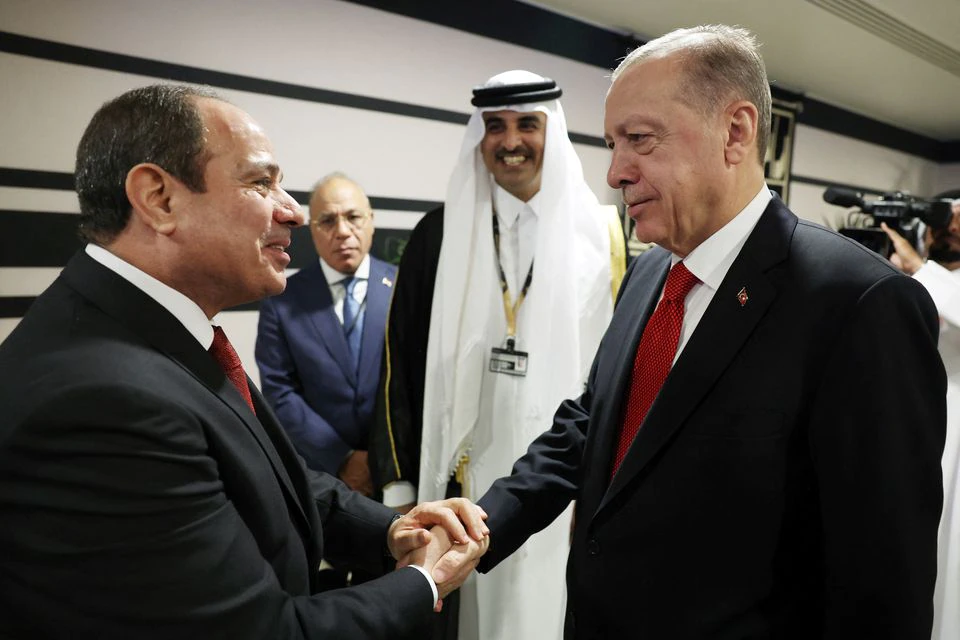Turkish President Recep Tayyip Erdogan’s handshake with his Egyptian counterpart Abdel-Fattah El-Sissi on November 20 marked a turning point in a relationship broken for over a decade by deep differences over the Arab Spring protest movements.
The same day, Turkey carried out its latest air strikes against Kurdish fighters in northern Syria, amid growing threats that it will stage a major ground operation. Why is Ankara moving to mend ties with some of its most bitter regional rivals, even as it escalates against others?
These two seemingly contradictory trends are in fact complementary parts of a regional strategy by Ankara to navigate the post-Arab Spring era, a policy defined by a reset of ties with some actors and escalation against others.
In recent months, Turkey has moved to mend fences with several regional rivals, notably Saudi Arabia, the United Arab Emirates (UAE), Egypt and Israel. By doing this, it appears intent on neutralizing these peripheral conflicts in order to focus on a handful of core foreign policy aims: blocking the nationalist and geopolitical aspirations of the Syrian-Kurdish dominated Democratic Union Party (PYD) and the associated People’s Defence Units (YPG), as well as facing down key rivals Iran and Greece.
Another major concern for Turkey is its economic crisis, which is still deepening as an election looms in 2023. Ankara hopes that warmer ties with the Gulf can help it secure financial investment. Negotiations over a $5 billion loan from Riyadh are already underway. Turkey is also in separate discussions with the UAE over a free trade agreement. With presidential and parliamentary elections slated for June, the timing of any Gulf financial bailout will be as crucial as the investment itself—another incentive for a rapid rapprochement.
At the height of the Arab Spring, Erdogan placed his opposition to Sissi, Syrian President Bashar al-Assad, the UAE’s Mohammed bin Zayed and, much later, Saudi Crown Prince Mohammad bin Salman at the heart of both his party’s political identity at home and Turkey’s geopolitical identity in the region—establishing a pro-revolution versus reactionary dynamic that helped shape the region for a decade. Now those days are over. The Erdogan-Sisi handshake can be seen as the symbolic closing act of a decade of Turkish regional policy shaped by the Arab Spring.
On the flip side of the coin, Turkey has been escalating against its foes and rivals in its immediate neighborhood. Ankara is intensifying military operations in northern Iraq and Syria against the Kurdistan Workers’ Party (PKK), and its Syrian-Kurdish affiliates the PYD and YPG. It has also stepped up its rhetoric against Tehran (which has responded in kind), and the Turkish-Iranian rivalry has expanded into the Southern Caucasus, Iraq, Syria and beyond. Finally, although the Eastern Mediterranean crisis, which pitted Turkey against a group of countries including Greece, Cyprus, Egypt, Israel, the UAE, and France over hydrocarbon sources and competing sovereignty claims, has recently become less tense, Turkish-Greek relations remain as explosive as ever.
A Stillborn New Order
The turbulence in Turkey’s relations with post-coup Egypt and the Gulf states, particularly the UAE and Saudi Arabia, was a result of the Arab Spring. Ankara’s support for the revolutions and for political Islam in regional politics was directly opposed by these governments, which saw these phenomena as threatening their very existence. This rivalry manifested itself first in political and ideological contestation, then in the form of competing geopolitical power plays in the region’s various conflict zones.
At the outset, the Arab uprisings were peaceful and civilian-led, focused more on political demands than the identity of protesters. International and regional discussions of the uprisings were framed in the language of democratization, political reform, and regime change. This narrative implied that a new domestic political order was emerging within states and a new regional order across the Middle East and North Africa. Turkey saw this process as irreversible and moved fast to champion it. Erdogan was the first international leader to call on veteran Egyptian president Hosni Mubarak to step down in the face of mass protests.
The Turkish government believed this stance would serve the country’s national interests and image. It hoped the political transformation of the region, dominated by Islamist groups, would produce pro-Turkish governments and a new regional order in which Ankara would play a leading role. The prominence of political Islam in the Arab uprisings and regional politics at the time also appealed to Ankara’s elites, who hailed from conservative Islamic backgrounds.
But this set up a political and ideological showdown pitting Turkey against Egypt, the UAE and Saudi Arabia. As the uprisings became militarized and turned into civil wars, these struggles took on geopolitical significance, with Turkey itself resorting to military means. Since the second half of 2016, Ankara has launched several military operations in Syria and Iraq and engaged in coercive diplomacy elsewhere, particularly in Libya and the Eastern Mediterranean, in competition with its Arab rivals as well as Greece and France.
However, starting from late 2020, Turkey began pursuing a reset of ties with its former Arab foes. This shift was triggered by several factors, including the changing nature of the United States’ presence in the region, a stalemate in regional conflicts, the emergence of a post-Arab Spring phase in which political Islam would play a limited role, and the emergence of an anti-Turkey alignment in the Eastern Mediterranean among several states including Greece, Cyprus, Egypt, Israel, the UAE and France on energy and security issues. Turkey’s ongoing economic downturn during this period also played a significant role.
In contrast with its rapprochement with the Gulf States and Egypt, Ankara appears to be escalating against its traditional core rivals. The contrast is clear in the case of another Ankara’s Arab Spring-era foes: Damascus. Erdogan is keen to seek rapprochement with the Syrian regime, even a potential meeting with Assad himself. On the other hand, Ankara is determined to block the Syrian Kurdish autonomy project dominated by the PYD and the YPG, and is inching towards a new military operation to that end.
Turkey sees these two policies as complementary rather than contradictory. It suspects that Damascus would not object to further pressure on the Kurdish movement, as this would weaken the latter vis-a-vis the regime, serving the interests of both Damascus and Ankara. It bears mentioning however that the question of repatriating the many thousands of Syrian refugees living in Turkey is likely to feature strongly in any conversation between Ankara and Damascus – but is unlikely to receive serious consideration from the latter.
Iran is also likely to have more adversarial relations with Turkey going forward, as they have opposing policies in Iraq, Syria, and Southern Caucasus. Ankara supports regional efforts to push back against Iran’s expansionist regional policy, although it is unlikely to join any institutionalized multilateral containment strategy, as envisioned by Israel and some Arab Gulf states.
The Turkish-Greek conflict, couched in competing narratives of national sovereignty, dates as far back as the establishment of both countries, with some issues stretching further still. But the intervention of Egypt, the UAE and Saudi Arabia on the side of Greece in a multilateral Eastern Mediterranean crisis was in part a response to Turkey’s Arab Spring policy, which those countries saw as threatening their own regime survival and interests.
Therefore, by mending ties with the Gulf-Arab states and Israel, Turkey hopes to undermine support for Greece and Cyprus, turning the Eastern Mediterranean crisis from a multilateral standoff pitting Turkey against multiple countries into primarily a bilateral one with Greece.
An Elite Consensus
Despite Erdogan and Sissi’s friendly handshake, several thorny issues will continue to dog Turkish-Egyptian relations for the foreseeable future. They include the future of Libya and the Eastern Mediterranean, and to a lesser extent Ethiopia. However, these disagreements can be better managed. At this stage, a key Turkish priority is to avoid seeing key regional powers take the side of Greece.
Turkey’s stance on the Arab Spring has left it with close ties to Islamist groups and networks across the region. Yet given the failure of many of these groups to secure political power, most have become pro-Turkey social networks at best, rather than influential political allies.
Turkey’s emerging post-Arab Spring regional policy is based on prioritization, paring down the broad engagement of the past decade to a few core issues, neutralizing a formidable bloc of opponents from across the region, and securing vital economic support to stabilize its battered economy ahead of a crucial national election in 2023. Given this policy redirection rests on an elite consensus among swathes of Turkey’s government and opposition, the current trend of reset and escalation is likely to continue irrespective of who holds power in Ankara after next year.
The opinions expressed in this article are those of the author and do not necessarily reflect the views of the Middle East Council on Global Affairs.

